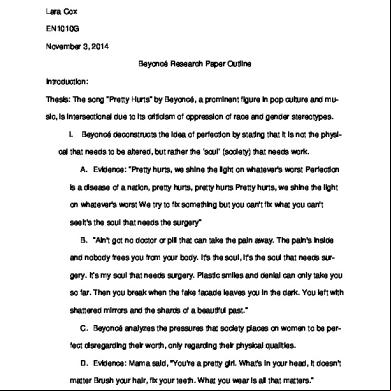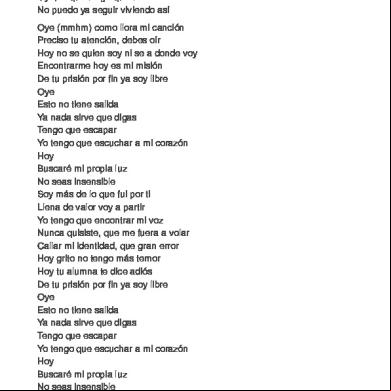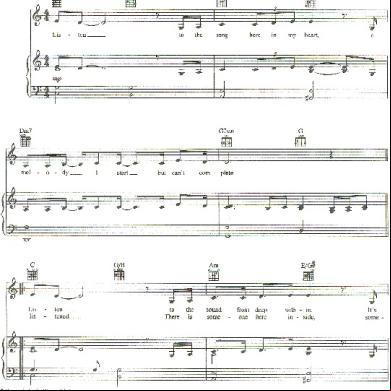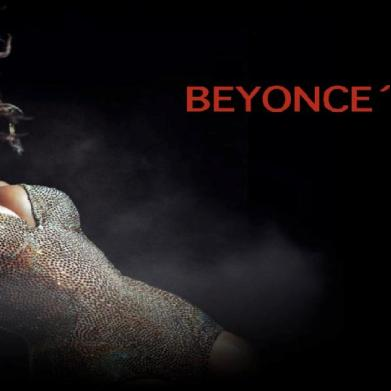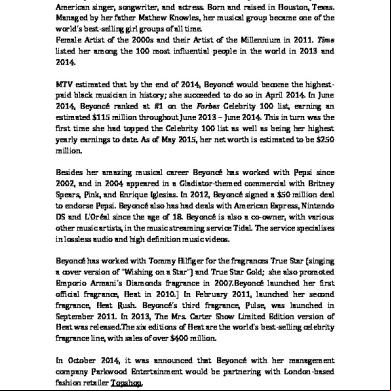Beyonce Outline 101m1g
This document was ed by and they confirmed that they have the permission to share it. If you are author or own the copyright of this book, please report to us by using this report form. Report 3b7i
Overview 3e4r5l
& View Beyonce Outline as PDF for free.
More details w3441
- Words: 316
- Pages: 2
Research Paper
Schmiedeskamp 1
Sam Schmiedeskamp Lara Cox EN1010G November 3, 2014 Beyoncé Research Paper Outline Introduction: Thesis: The song “Pretty Hurts” by Beyoncé, a prominent figure in pop culture and music, is intersectional due to its criticism of oppression of race and gender stereotypes. I.
Beyoncé deconstructs the idea of perfection by stating that it is not the physi-
cal that needs to be altered, but rather the „soul‟ (society) that needs work. A. Evidence: “Pretty hurts, we shine the light on whatever's worst Perfection is a disease of a nation, pretty hurts, pretty hurts Pretty hurts, we shine the light on whatever's worst We try to fix something but you can't fix what you can't seeIt's the soul that needs the surgery” B. “Ain't got no doctor or pill that can take the pain away. The pain's inside and nobody frees you from your body. It's the soul, it's the soul that needs surgery. It‟s my soul that needs surgery. Plastic smiles and denial can only take you so far. Then you break when the fake facade leaves you in the dark. You left with shattered mirrors and the shards of a beautiful past.” C. Beyoncé analyzes the pressures that society places on women to be perfect disregarding their worth, only regarding their physical qualities. D. Evidence: Mama said, "You're a pretty girl. What's in your head, it doesn't matter Brush your hair, fix your teeth. What you wear is all that matters.”
Research Paper
Schmiedeskamp 2
II. Beyoncé outlines the standards of beauty that are gatekeeped by society, addressing only white women, excluding black women from the standard of beauty. A. Evidence: “Blonder hair, flat chest TV says, „Bigger is better.‟ South beach, sugar free Vogue says, „Thinner is better.‟” III. Conclusion: “Pretty Hurts” by Beyoncé deconstructs the social constructs put in place by society which define the worth of race and gender.
Schmiedeskamp 1
Sam Schmiedeskamp Lara Cox EN1010G November 3, 2014 Beyoncé Research Paper Outline Introduction: Thesis: The song “Pretty Hurts” by Beyoncé, a prominent figure in pop culture and music, is intersectional due to its criticism of oppression of race and gender stereotypes. I.
Beyoncé deconstructs the idea of perfection by stating that it is not the physi-
cal that needs to be altered, but rather the „soul‟ (society) that needs work. A. Evidence: “Pretty hurts, we shine the light on whatever's worst Perfection is a disease of a nation, pretty hurts, pretty hurts Pretty hurts, we shine the light on whatever's worst We try to fix something but you can't fix what you can't seeIt's the soul that needs the surgery” B. “Ain't got no doctor or pill that can take the pain away. The pain's inside and nobody frees you from your body. It's the soul, it's the soul that needs surgery. It‟s my soul that needs surgery. Plastic smiles and denial can only take you so far. Then you break when the fake facade leaves you in the dark. You left with shattered mirrors and the shards of a beautiful past.” C. Beyoncé analyzes the pressures that society places on women to be perfect disregarding their worth, only regarding their physical qualities. D. Evidence: Mama said, "You're a pretty girl. What's in your head, it doesn't matter Brush your hair, fix your teeth. What you wear is all that matters.”
Research Paper
Schmiedeskamp 2
II. Beyoncé outlines the standards of beauty that are gatekeeped by society, addressing only white women, excluding black women from the standard of beauty. A. Evidence: “Blonder hair, flat chest TV says, „Bigger is better.‟ South beach, sugar free Vogue says, „Thinner is better.‟” III. Conclusion: “Pretty Hurts” by Beyoncé deconstructs the social constructs put in place by society which define the worth of race and gender.
